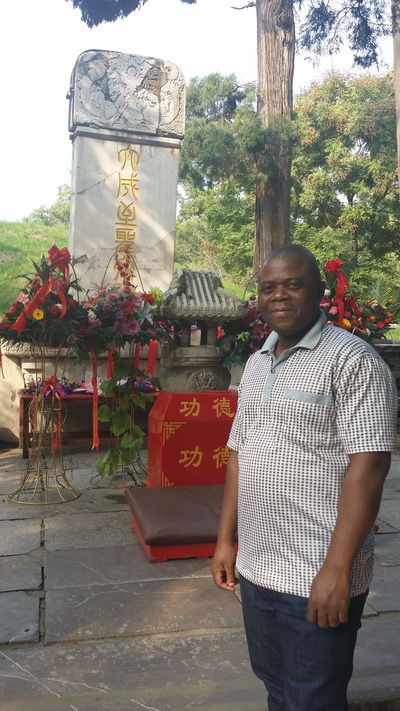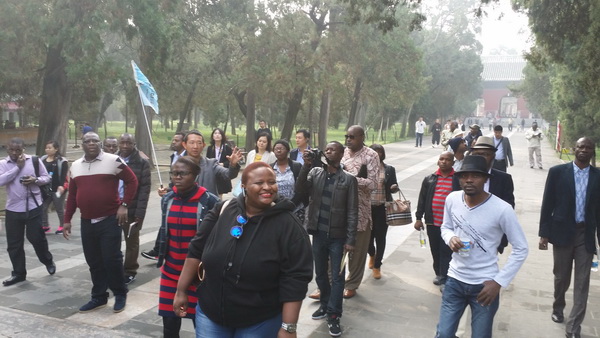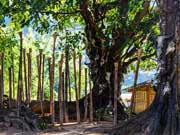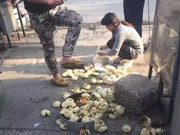

At the Tomb of Confucius

The author
The Cemetery of Confucius is a cemetery of the Kong clan (the descendants of Confucius). Confucius himself and some of his disciples are buried there, as well as many thousands of his descendants.
Accordingly, over 100,000 descendants of Confucius were buried here, beginning in the Eastern Zhou dynasty and ending in the early 20th century.
Cultural relics, beautiful scenes are designed with Chinese characteristics, portraying the country’s identities as well as attracting thousands of tourists on a daily basis.

African journalists touring Confucius Compound (Oct. 17, 2016)
Confucius’s contributions to societies
China’s reformers had based their activities on the moral teachings and philosophical opinions of Confucius and other scholars, thus contributing to the rapid growth and development of the country in recent years.
Confucius was said to be one of the few leaders who based their philosophy on the virtues that are required for the day-to-day living. His philosophy centered on personal and governmental morality, correctness of social relationships, justice and sincerity. Known as Master Kong to the Chinese, he taught people how to cultivate the value of modesty, planning, respect, moral behavior, honesty and sincerity, apart from common sense. Confucius was of the opinion that true happiness would only be brought from well-planned actions and helping of the fellow men. His philosophy was aimed at benefiting not only a few selected groups, but all the people of the empire he was a part of.
He stressed the need to give due respect to superiors but he also said that the subordinates must give advice to their superiors if they believed the superiors were taking the wrong course of action. He was said to be the first teacher in China whose aim was to make education available for all; based on which Chinese Language and cultural institutions in his honor are being established around the world.
Confucius taught that people should have compassion for one another, and to avoid treating others in ways that they themselves would not wish to be treated: “What you do not wish for yourself, do not do to others.” (Analects 12.2) “In order to be compassionate, people should avoid self-aggrandizement and be simple in manner and slow of speech. They should practice altruism and self restraint.”
Besides, what this site teaches is for others to know their cultural identities and make them contribute to economies in improving their societies.
The tour of Confucius Compound is one of our fellowship activities in knowing more about China to tell the real stories of China and Africa as the two sides strengthen economic and development cooperation.
Fredrick P. W. Gaye is an editor of In Profile Daily newspaper in Liberia and a 2016 fellow at the China Africa Press Center (CAPC) in Beijing. He can be reached at: fgaye.inprofile@gmail.com
 |

 Who Will Fit The Chinese Roles In Game Of Thrones?
Who Will Fit The Chinese Roles In Game Of Thrones? China's Hubei Shennongjia added to World Heritage List
China's Hubei Shennongjia added to World Heritage List Cute Dog At Fruit Stand Becomes Latest Internet Sensation
Cute Dog At Fruit Stand Becomes Latest Internet Sensation Top 10 livable Chinese cities
Top 10 livable Chinese cities The last primitive tribe in China
The last primitive tribe in China China's first intelligent security robot debuts in Chongqing
China's first intelligent security robot debuts in Chongqing A Total of 3,552 Subscribers Vanish In Two Days; YouTube Closes All Doors to Users’ Inquiries
A Total of 3,552 Subscribers Vanish In Two Days; YouTube Closes All Doors to Users’ Inquiries Out of this world! Futuristic UFO-shaped yacht has its own garden and a stunning underwater viewing deck
Out of this world! Futuristic UFO-shaped yacht has its own garden and a stunning underwater viewing deck An old tea house in Chengdu
An old tea house in Chengdu Furious Customer Crushes All the Buns from Vendor Just Because He Was Given the Wrong Flavor
Furious Customer Crushes All the Buns from Vendor Just Because He Was Given the Wrong Flavor